"El día que me quieras" is an Argentine tango with music by Carlos Gardel and lyrics by Alfredo Le Pera. It is considered one of the most popular songs of the 20th century and one of the best Latin songs of all time. Originally featured in the 1935 film of the same name, sung by Gardel himself, it became a heavily recorded tango standard, even by artists outside of the realm of tango. It has subsequently been covered by various artists such as Luis Miguel, Julio Iglesias, Michael Bolton Roberto Carlos, Raphael de España and Shlomo Idov who translated the song to Hebrew. The song was inducted into the Latin Grammy Hall of Fame in 2001. "El día que me quieras" was honored at the 2014 La Musa Awards as "La Canción de Todos los Tiempos". It was among the tango standards selected by Plácido Domingo for his 1981 album Plácido Domingo Sings Tangos. In addition to Domingo, the song has been covered by operatic tenors including José Carreras, Juan Diego Florez, Christian Ketter, and Alfredo Kraus.

"Como Tu Mujer" is a song and title track written and produced by Mexican singer-songwriter Marco Antonio Solís and first recorded by Spanish performer Rocío Dúrcal. It was released in 1988 as the first single from studio album Como Tu Mujer (1988), this would be the first album produced by Solís for the singer. This song became a hit all over Latin America and in the United States where it went on to number-one for 10 consecutive weeks. This song is considered by some to be one of her most successful singles. This song earned her many awards such as the Premio Aplauso FM 98, given by "Spanish Broadcasting System", in Los Angeles, California and Premio TV y Novelas for 'Best Female Artist'.

"Strani amori'" is a song by Italian singer Laura Pausini, released in February 1994 as the first single from her second studio album, Laura.
"¡Ay, Amor!" is a ballad written and performed by Mexican singer-songwriter Ana Gabriel and produced by Mariano Pérez Bautista. It was released as the first single from her third studio album, Pecado Original (1987). This song became the second to spend 14 consecutive weeks at number one in the Billboard Hot Latin Tracks chart, after fellow Mexican singer Daniela Romo with "De Mí Enamórate", being surpassed in the same year by Yuri when her single "Qué Te Pasa" achieved sixteen weeks at the top of the chart.
"Hombres al Borde de un Ataque de Celos" is a dance song written by J.R. Florez, produced by Gian Pietro Felisatti and Loris Ceroni, and performed by Mexican singer Yuri. It was released in 1988 as the first single from her studio album Isla del Sol (1988), and became her second number-one single in the Billboard Hot Latin Tracks chart after "Qué Te Pasa" in 1988. Isla del Sol was the first album recorded by the singer on CBS, her record label until 1995. This song became one of her staple on every live performance and was also included on the live album Vive la Historia.
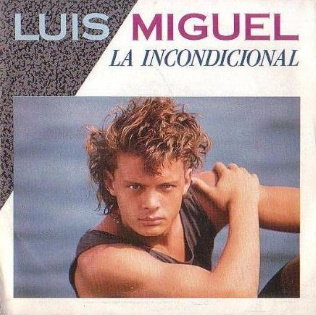
"La Incondicional" is a song written, produced, and arranged by Spanish musician Juan Carlos Calderón and performed by Mexican singer Luis Miguel. It was released in 1989 via WEA Latina as the third single from Miguel's sixth studio album, Busca una Mujer (1988). The song became his second #1 single on the Billboard Hot Latin Tracks chart after "Ahora Te Puedes Marchar" in 1987. The song broke several airplay records in Latin America, topping the charts in Mexico, Chile and Peru; and the top-ten in other countries. The success of the song helped push the album to #3 on the Billboard Latin Pop Albums with approximate sales of four million units.

"Baila Mi Rumba" is a dance song written by Isidore York, Rudy Pérez and V. M. Hernández, produced by Pérez and Emilio Estefan, Jr., and performed by Venezuelan singer José Luis Rodríguez "El Puma". It was released in 1989 as the lead single from his studio album Tengo Derecho a Ser Feliz (1989), and became his second number-one single in the Billboard Hot Latin Tracks chart after "Y Tú También Llorarás" in 1987. The success of the song led its parent album to its peak at number two in the Billboard Latin Pop Albums.

"Nieva, Nieva" is a song performed by the Mexican singer Paulina Rubio, written by Cesar Valle and C. Sánchez and produced by Miguel Blasco. The song was recorded in Madrid, Spain, through the promotion of Rubio's debut album, La Chica Dorada and the recording sessions for her second album. It was eventually released as the lead single from her second studio album 24 Kilates on September 29, 1993.
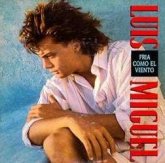
"Fría Como el Viento" is a ballad written, produced and arranged by Juan Carlos Calderón and performed by Mexican singer Luis Miguel. It was released as the first single from the Grammy-nominated studio album Busca una Mujer (1988). The song became the third number-one single for the singer in the Billboard Hot Latin Tracks chart after "Ahora Te Puedes Marchar" in 1987 and "La Incondicional", the preceding single.

"Tengo Todo Excepto a Ti" is a song written, produced, and arranged by Juan Carlos Calderón, and performed by Mexican singer Luis Miguel. It was released as the lead single from his studio album 20 Años (1990). It reached the number one position all over Ibero-America, became his fourth number-one single in the Billboard Hot Latin Songs chart after "Ahora Te Puedes Marchar", "La Incondicional" and "Fría Como el Viento" and was nominated for Pop Song of the Year at the Lo Nuestro Awards. The parent album peaked at number two in the Latin Pop Albums chart and sold more than 600,000 copies in its first week of release.

"Fuego Contra Fuego" is the debut single by Puerto Rican singer Ricky Martin from his debut solo studio album Ricky Martin '91 (1991). It was released by Sony Music Mexico and CBS Discos on September 9, 1991. A music video was also released.

"América América" is a song written by José Luis Armenteros and Pablo Herrero and performed by Spanish performer Nino Bravo. It was released as a single for his fifth studio album y volumen 5 (1973). The song reached number one on the Spanish Singles Chart in 1973. In 2013, the song was inducted into the Latin Grammy Hall of Fame.
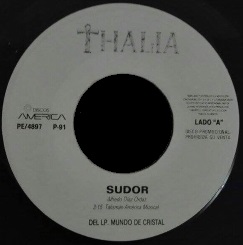
"Sudor" is a song by the Mexican singer Thalía released as the first single of her second album release Mundo de Cristal, in 1991. "Sudor" is the second of four songs in which Thalía talks about body fluids, the others are "Saliva", "Sangre" and "Lágrimas" from the albums Thalía, Love and En éxtasis, respectively.
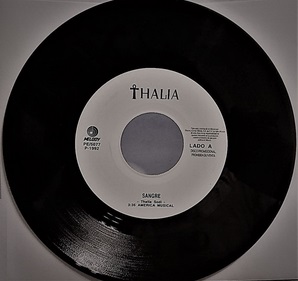
"Sangre" is the first single taken from the album Love by Mexican singer Thalía. The song was composed by the singer herself and the lyrics are dedicated to Alfredo Díaz Ordáz who died before the album was released. The song was successful in Mexico peaking at number two in the Notitas Musicales chart. "Sangre" is the third of four songs in which Thalía talks about body fluids, the others are "Saliva", "Sudor" and "Lágrimas" from the albums Thalía, Mundo de Cristal and En éxtasis, respectively.
"La Media Vuelta" is a song written and performed by Mexican singer José Alfredo Jiménez released in 1963. One of Jiménez' most famous compositions, the song has become part of the traditional Mexican musical repertoire, and has been recorded by dozens of singers and groups.
"Todo y Nada" is a song written and performed by Mexican singer Vicente Garrido Calderón released in 1957 and originally recorded by Los Tres Ases and Lucho Gatica. It was covered by Mexican singer Luis Miguel on his album Segundo Romance (1994) where it was released as the third single from the album in 1995 and reached number three on the Billboard Hot Latin Songs and number one on the Latin Pop Airplay charts, becoming his third number-one song on the latter chart. "Todo y Nada" became Miguel's third consecutive number-one song from Segundo Romance in Mexico; and became a top-five hit in Chile, Panama and Puerto Rico.
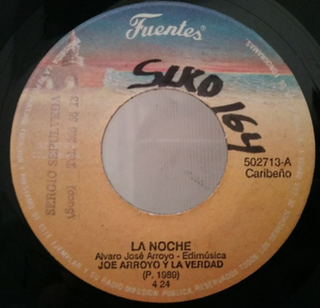
"La Noche" is a salsa song written and performed by the Colombian singer Joe Arroyo. Billboard called it a "groundbreaking song" that made Arroyo "a groundbreaking force in Colombian salsa."

"Burbujas de Amor" is a song by Dominican singer-songwriter Juan Luis Guerra, released as the third single of his album Bachata Rosa (1990). It is widely considered one of Guerra's most popular songs. The song was a commercial success and became an international hit in Europe and Latin America. It peaked at number 2 on the Hot Latin Songs chart. The track received universal acclaim from critics and was praised for its sophisticated lyrics and elegance. The song was marketed as a bachata; however, it's musical form is actually bolero.
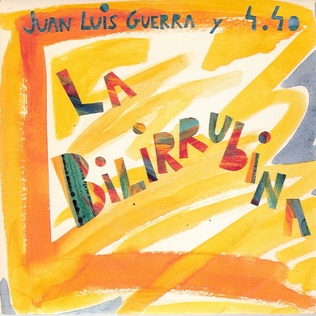
"La Bilirrubina" is a song by Dominican singer-songwriter Juan Luis Guerra. It was written by Guerra and released by Karem Records on 1990 and 1991 in Europe as the second single from his fifth studio album, Bachata Rosa. It was nominated for Record of the Year at 1991 Lo Nuestro Awards. The merengue track is considered one of Guerra's signature songs and most popular. It receive positive reviews and was listed one of the best tracks of the album.
This is the singles discography for Mexican singer Ana Gabriel.













